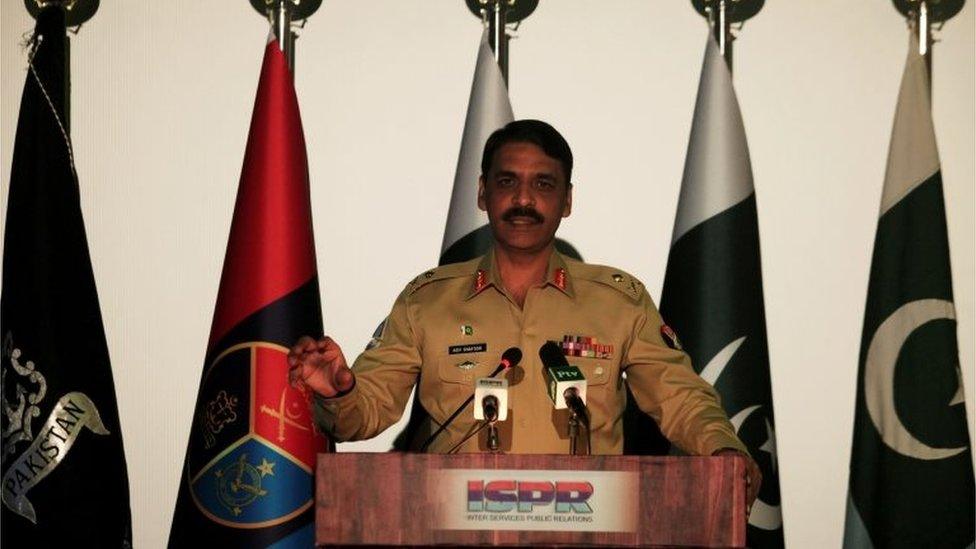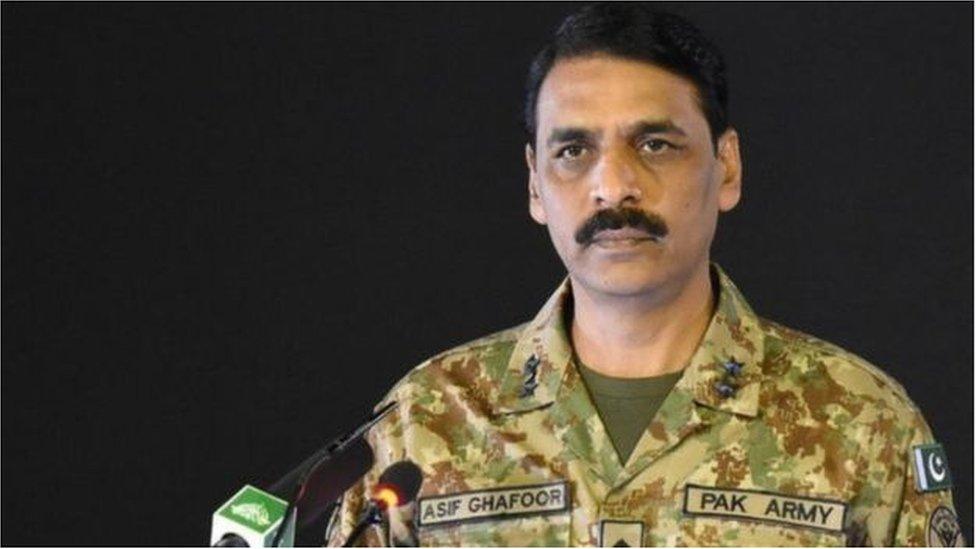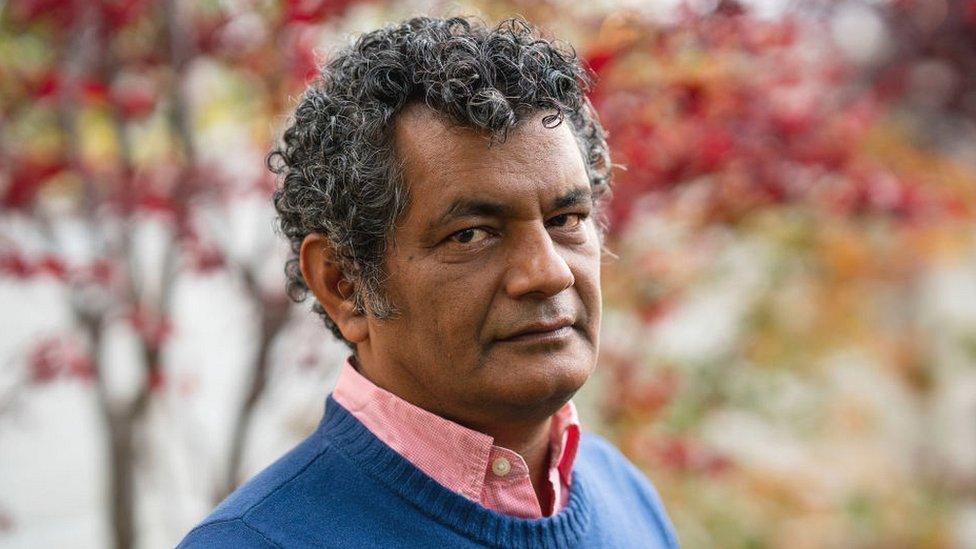Pakistan two-star general: Farewell to a social media celebrity
- Published

Maj-Gen Ghafoor raised eyebrows with some of his tactics
It is not often a military spokesperson doubles as a national celebrity, about whom internet memes are made and whose name trends on Twitter.
But Pakistan's Maj-Gen Asif Ghafoor is one such individual. As he leaves his post after three headline-grabbing years, praise and criticism have poured in in equal measure.
The transfer was expected but it came days after an unseemly social media spat with TV anchor Sana Bucha, which raised eyebrows about his conduct.
Allow X content?
This article contains content provided by X. We ask for your permission before anything is loaded, as they may be using cookies and other technologies. You may want to read X’s cookie policy, external and privacy policy, external before accepting. To view this content choose ‘accept and continue’.

Allow X content?
This article contains content provided by X. We ask for your permission before anything is loaded, as they may be using cookies and other technologies. You may want to read X’s cookie policy, external and privacy policy, external before accepting. To view this content choose ‘accept and continue’.

His successor will find the departing director-general of the Inter-Services Public Relations (ISPR) quite an act to follow. Gen Ghafoor's late-night musings on Twitter provided plenty of controversy and copious fodder for Pakistan's twitterati.
Subjects for discussion could appear random - he irked India by praising Bollywood actress Deepika Padukone for attending anti-government protests in Delhi. But he could just as easily post about burn ointment, butchers or stray dogs.
Combative tweets from his personal account in the past few days showed how he sought to control the narrative for the world's sixth largest army.
The general frequently sparred with retired Indian military officials or journalists on Twitter; at other times he would "troll" Pakistani journalists and individuals who criticised the country's military.
Earlier this week he locked horns with Sana Bucha, external after she tweeted criticising the military. Ms Bucha retaliated by reminding him "to show some class" but that was met with a thinly veiled warning that she should "make a choice".
Allow X content?
This article contains content provided by X. We ask for your permission before anything is loaded, as they may be using cookies and other technologies. You may want to read X’s cookie policy, external and privacy policy, external before accepting. To view this content choose ‘accept and continue’.

Soon after the exchange, a trend started on Twitter abusing her, which Ms Bucha said had happened before.
"They drag in my family, my friends or even remote acquaintances. As a woman, the suffering is more because they think it's easy to suppress her into submission," she told the BBC.
Pakistan, which has a history of coups, has had less and less space in recent years for critics of its powerful army. Ms Bucha thinks the ISPR should be more careful about its conduct on social media, considering civil-military relations.
The official position of the ISPR is that the DG "can tweet from his personal account in a personal capacity".

Gen Ghafoor is off to command an infantry division in Okara, Punjab province
But not everyone in the top brass agrees. One retired senior military official thought there should be "no personal account".
"At such a senior post, level and position, there is nothing personal," he told the BBC. "In military PR, one should not be reacting to every issue, comment or incident. It should only be when it is directly affecting the organisation or when there is a demand to take a position."
Another former army general, Ghulam Mustafa, thought using social media in a personal capacity to "defend online attacks on the Pakistani army" was justified. But he did concede that "at times, the DG ISPR's response in a personal capacity hasn't impacted very positively".
According to strategic communications specialist and former journalist Aniq Zafar, officials using their personal accounts will always be seen to be projecting the narrative of the institution they work for, so no disclaimer works.
"Individuals in leadership positions should be rather careful in the use of social media, careful in selection of words and careful in picking which fights to fight," he told the BBC.
Amid hostilities between Pakistan and India in 2019, the departing spokesman's provocative tweets invited criticism from both civilian and military circles.
But his tactics earned grudging praise from the Indian army's national cyber security co-ordinator in December.
India and Pakistan's "war-mongering" media
"When they conduct narrative warfare, let's say in the case of Kashmir, the message they send to Europe is that human rights are being infringed. So, they seem to have got their act together," said Lt-Gen (retd) Rajesh Pant, India Today reported.
Asif Ghafoor will also be remembered for his emphasis on "5th Generation Warfare" in his numerous press conferences and tweets, which he said was being waged against Pakistan on social media and needed a robust defence.
No military expert has settled on what defines "5GW" but it essentially means non-combat, asymmetrical warfare in which non-traditional tools are used.
Last April, Facebook removed 103 groups and accounts, which it said were linked to ISPR employees.
Twitter also suspended accounts of many Pakistani users last year, allegedly for tweeting criticism of India's government over Kashmir, which both countries dispute.
Gen Ghafoor took to Twitter many times to assure users that requests had been made to the social media giant to look into the matter and urged his more than 450,000 followers to behave. "Stay put responsible… keep adhering to Twitter rules, likewise own," he tweeted in October.
A former brigadier, Farooq Hameed, told the BBC the ISPR's role had evolved over the time due to the changing nature of social media platforms.
"The DG ISPR is performing a national duty by using his official and personal Twitter account on social media to project threats and challenges to Pakistan's national interests," he said.
But the retired senior military official who thought there should be no personal account was not convinced.
"The army should never be seen in the lead on matters of national policy, diplomacy or domestic issues. Let the government defend the armed forces against local or outside criticism."
- Published7 January 2020
